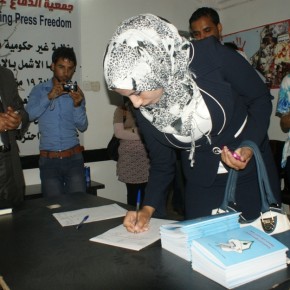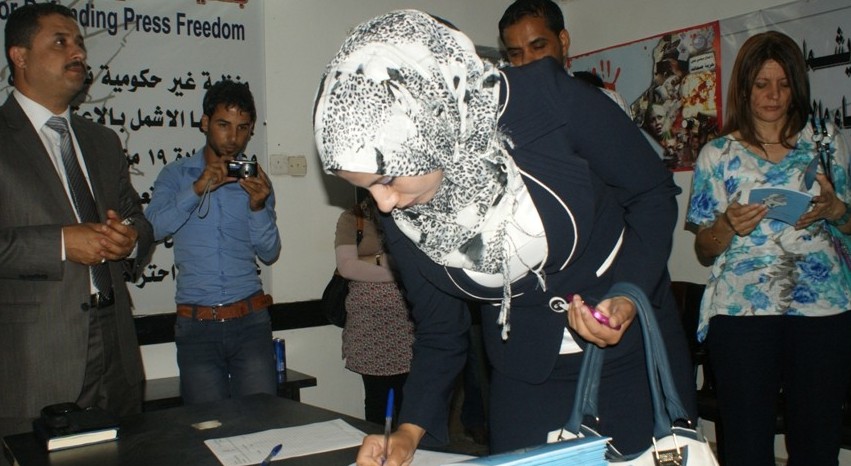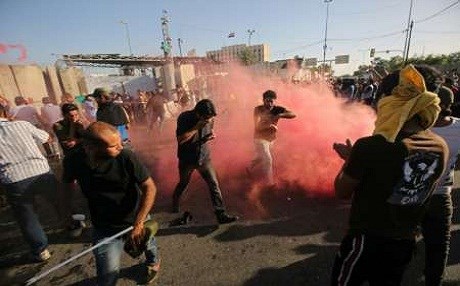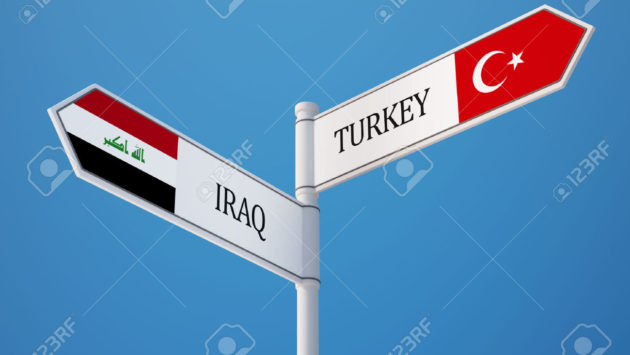The Iraqi federal court postponed issuing a decision in the “journalists’ rights law” case until next month – August 2012
The Iraqi federal court postponed issuing a decision in the “journalists’ rights law” case until next month – August 2012, in order to give Usama al–Najafi more time to reply to the arguments submitted by the Society for Defending Press Freedom.  The Society submitted the lawsuit to repeal the “journalists’ rights law” on behalf of its members on 26 April 2012, saying that the law violated four articles of the Constitution, especially article 46 which states that laws must not infringe upon the rights and freedoms guaranteed by the Iraqi Constitution. In addition, the Society argued, the law restores domination of the media by executive powers, as occurred under the previous regime. The law would end freedom of the press, which is guaranteed by article 38 of the Iraqi Constitution and also by many international conventions that the Iraqi state has signed, including the Convention against Corruption that protects the people’s access to information. The Society for Defending Press Freedom brought this case to the Iraqi court, believing there was no way it could refuse to make a decision because the “journalists’ rights law” so clearly violates the Constitution. This understanding was shared by hundreds of Iraqi and international journalists and activists who are supporting the case to abolish this law. The Society now calls upon Usama al-Najafi to remember his duty to protect the democratic process here in Iraq, which he has taken an oath to do. Because the “journalists’ rights law” would destroy democracy, the Society will be obliged to bring another lawsuit accusing the president of parliament of breaking his oath if he insists upon maintaining this law. He should admit that the legislation is illegal, and an illegitimate threat to freedom of the press and freedom of expression, which are the foundations of the democratic process.
The Society submitted the lawsuit to repeal the “journalists’ rights law” on behalf of its members on 26 April 2012, saying that the law violated four articles of the Constitution, especially article 46 which states that laws must not infringe upon the rights and freedoms guaranteed by the Iraqi Constitution. In addition, the Society argued, the law restores domination of the media by executive powers, as occurred under the previous regime. The law would end freedom of the press, which is guaranteed by article 38 of the Iraqi Constitution and also by many international conventions that the Iraqi state has signed, including the Convention against Corruption that protects the people’s access to information. The Society for Defending Press Freedom brought this case to the Iraqi court, believing there was no way it could refuse to make a decision because the “journalists’ rights law” so clearly violates the Constitution. This understanding was shared by hundreds of Iraqi and international journalists and activists who are supporting the case to abolish this law. The Society now calls upon Usama al-Najafi to remember his duty to protect the democratic process here in Iraq, which he has taken an oath to do. Because the “journalists’ rights law” would destroy democracy, the Society will be obliged to bring another lawsuit accusing the president of parliament of breaking his oath if he insists upon maintaining this law. He should admit that the legislation is illegal, and an illegitimate threat to freedom of the press and freedom of expression, which are the foundations of the democratic process.
The Iraqi federal court postponed issuing a decision in the “journalists’ rights law” case until next month – August 2012, in order to give Usama al–Najafi more time to reply to the arguments submitted by the Society for Defending Press Freedom.  The Society submitted the lawsuit to repeal the “journalists’ rights law” on behalf of its members on 26 April 2012, saying that the law violated four articles of the Constitution, especially article 46 which states that laws must not infringe upon the rights and freedoms guaranteed by the Iraqi Constitution. In addition, the Society argued, the law restores domination of the media by executive powers, as occurred under the previous regime. The law would end freedom of the press, which is guaranteed by article 38 of the Iraqi Constitution and also by many international conventions that the Iraqi state has signed, including the Convention against Corruption that protects the people’s access to information. The Society for Defending Press Freedom brought this case to the Iraqi court, believing there was no way it could refuse to make a decision because the “journalists’ rights law” so clearly violates the Constitution. This understanding was shared by hundreds of Iraqi and international journalists and activists who are supporting the case to abolish this law. The Society now calls upon Usama al-Najafi to remember his duty to protect the democratic process here in Iraq, which he has taken an oath to do. Because the “journalists’ rights law” would destroy democracy, the Society will be obliged to bring another lawsuit accusing the president of parliament of breaking his oath if he insists upon maintaining this law. He should admit that the legislation is illegal, and an illegitimate threat to freedom of the press and freedom of expression, which are the foundations of the democratic process.
The Society submitted the lawsuit to repeal the “journalists’ rights law” on behalf of its members on 26 April 2012, saying that the law violated four articles of the Constitution, especially article 46 which states that laws must not infringe upon the rights and freedoms guaranteed by the Iraqi Constitution. In addition, the Society argued, the law restores domination of the media by executive powers, as occurred under the previous regime. The law would end freedom of the press, which is guaranteed by article 38 of the Iraqi Constitution and also by many international conventions that the Iraqi state has signed, including the Convention against Corruption that protects the people’s access to information. The Society for Defending Press Freedom brought this case to the Iraqi court, believing there was no way it could refuse to make a decision because the “journalists’ rights law” so clearly violates the Constitution. This understanding was shared by hundreds of Iraqi and international journalists and activists who are supporting the case to abolish this law. The Society now calls upon Usama al-Najafi to remember his duty to protect the democratic process here in Iraq, which he has taken an oath to do. Because the “journalists’ rights law” would destroy democracy, the Society will be obliged to bring another lawsuit accusing the president of parliament of breaking his oath if he insists upon maintaining this law. He should admit that the legislation is illegal, and an illegitimate threat to freedom of the press and freedom of expression, which are the foundations of the democratic process.




